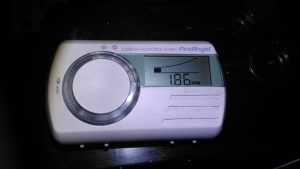Here’s something different – below is a standard domestic carbon monoxide alarm, (I did a teardown of the same detector here), but in this case it’s not detecting any carbon monoxide, but another gas in the surrounding atmosphere. We recently had an issue with these detectors on board the boat, the alarms were sounding in the middle of the night, at ridiculous levels displayed, with no fuel-burning appliances running! While it didn’t become obvious at the time, the gas being detected was hydrogen, given off from the house battery bank while they were on charge.

I have long been aware of the fact that electrochemical gas sensors have some cross-sensitivity, and sensors are available that are specifically designed to not respond to other gases (hydrogen in particular, as this gas is actually part of the sensor reaction. Much more information about the subject is over here). I’ve no doubt these more industrial grade sensors are much more expensive than the cheap kind used in domestic alarms though, not to mention there aren’t usually massive lead-acid battery banks in houses, so the concept of having hydrogen in the air doesn’t usually happen.
However, I’ve seen plenty of these exact type, and other types of the same brand used on boats. The user manual for this particular alarm doesn’t mention the possibility of cross-sensitivity though, and this could lead someone to doubt their alarm is working correctly, and to stop trusting it or remove it entirely due to false triggering.
As I’ve not been able to find any data on the sensor used in this detector, I don’t know how sensitive it is to hydrogen, the image above was taken with an alarm placed directly over the cell opening of a large lead-acid battery on charge at 14.7v to deliberately cause some gassing. This was the highest reading obtained, the detector didn’t take long to respond either. As the gas mix coming out of the cell is 2:1 H²/O² this reading is clearly low, but it’s still plenty enough to sound the alarm within a few minutes.
For us on boats, with potentially explosive gas mixtures being able to gather this cross sensitivity is potentially a good thing – the alarm made sure we were well aware of something going wrong before a dangerous concentration was present. (Hydrogen is flammable in air between 4% & 75%).
To prevent this happening in future, I’ll be installing some forced ventilation into the battery compartment, triggered by a hydrogen sensor. More to come on this soon!

I’m so glad we found this; we have the same problem! Our widebeam canal boat has a large lead-acid battery bank in the engine bay and on evenings when we’ve had the batteries charging from shore power the CO alarm has gone off when we’re not using the stove. Did you do a follow-up post about the fan?? Do you have a link to it or can you tell me what you did?